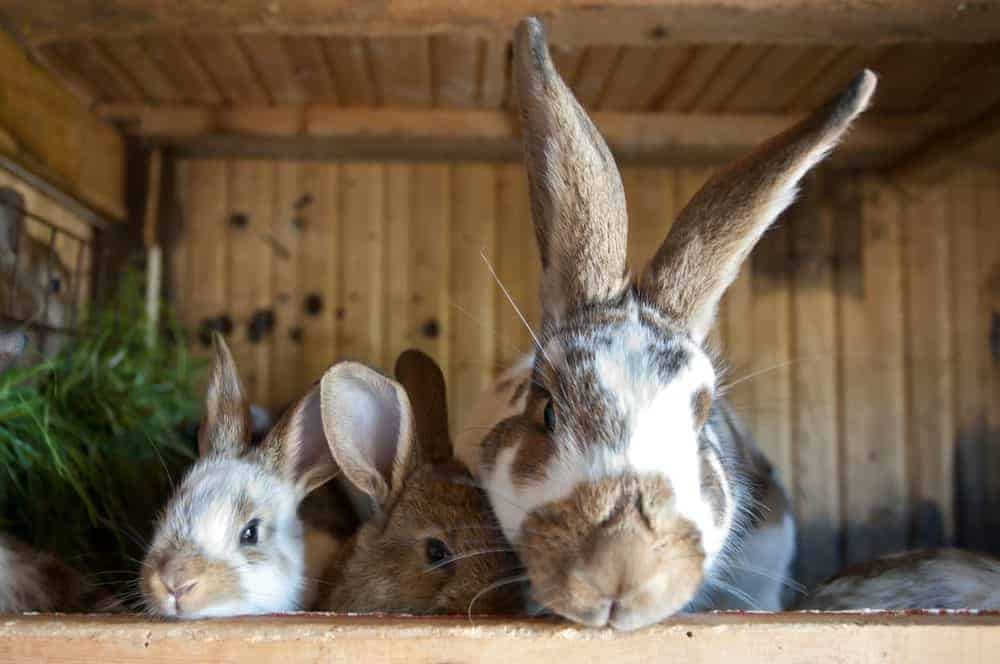
Come winter, wild rabbits are tucked away in underground warrens that protect them from the worst of the weather. And, while outdoor pet rabbits are quite good at managing colder temperatures – unlike guinea pigs who should be moved indoors for the winter – they still need a helping hand to stay snug and warm.
Bunnies kept outdoors shed their light summer coats and grow thicker fur to protect them from the elements. Their outdoor home needs extra protection too. Pet rabbits should ideally be housed in a shed or outbuilding during wintertime, with space to run around if it’s too cold or wet outside. If this is not possible, then it’s essential to ensure that their hutch and run is winter-proof and placed in a sheltered area, away from wind and driving rain. You should also give it a ‘home maintenance’ check.
Bunny home check
- Check the roofing felt to make sure it’s completely watertight and that all the walls are in good condition, with no water staining that might suggest that rain is seeping in from under the roof.
- Make sure the hutch is always raised from ground level, on bricks or a frame, to allow air to circulate and prevent damp entering from below.
- Extra insulation will be required in the form of a hutch cover. You can buy these from pet retailers or make your own using tarpaulin or old carpets covered in a weatherproof outer layer. Your rabbits will still need fresh air, so you need to create a cover that provides protection from cold and wind but provides good ventilation.
- Insulate the floor of your rabbits’ sleeping box area with thick layers of newspaper and provide plenty of extra bedding hay for them to snuggle up in. Ensure this is regularly changed and doesn’t become damp. Blankets are not recommended as bunnies may chew on them, causing a blockage in the gut.
- During really cold weather, provide a couple pet-safe heated pads that you can warm up in the microwave each evening before placing in their home for them to lie on.
A winter rabbit routine
- Check water bottles several times a day to make sure the water is not too cold or has frozen. Also check the metal spout hasn’t iced up.
- Perform ‘bottom checks’ daily to prevent flystrike (a potentially fatal condition where flies lay their eggs on your rabbit that then hatch out into maggots, which eat into your rabbit's flesh). Although more common in summer, flystrike can occur in winter when flies seek the warmth of your rabbits’ accommodation and use the opportunity to lay their eggs.
- Check your rabbits’ feet daily to look out for sore hocks as this may be a sign of an underlying disease such as arthritis. It can also mean that their accommodation needs cleaning more regularly as the condition is often caused by rabbits sitting in their own urine, which irritates their sensitive, thin skin.
- Rabbits still need regular exercise during the winter, so find time during the warmer parts of the day to let them have a runabout in the garden or allocate a room indoors (that’s not too warm) where they can stretch their legs every day.
- Your bunnies will need more food in the winter in order to maintain their body temperature and condition, so remember to allow for this when allocating their daily nuggets, fresh greens and feeding hay.
Flashes and bangs at New Year
New Year celebrations can mean fireworks and all those bangs and flashes can be an extremely frightening for all pets – particularly those housed outside. Try to minimise the impact by:
- Moving your rabbits’ enclosure somewhere more sheltered, such as into a quiet, cool room of the house, or into a shed or empty garage. If this isn’t possible, cover it with blankets to help muffle the sound during the celebrations.
- Providing some extra bedding to burrow into to help your bunnies feel more secure – try Burgess Excel Feeding Hay with Chamomile, which is renowned for its calming properties.
- Try Pet Remedy, a clinically-proven calming blend of valerian and vetiver, sweet basil and clary sage essential oils, as it may help and is suitable for use with small pets. It’s available as a calming spray, calming wipes and battery-operated atomiser.
If you found this interesting, you may also like:
Rabbits should eat a carrot a day – and other bunny myths
Find out what you should feed your rabbit to ensure they have a diet that’s nutritionally right for them and their specialised digestive system…
It’s all about the hay
For rabbits, grass and hay is the most important component of their diet – and not any old hay will do, as Burgess in-house vet Dr Suzanne Moyes explains…
Happy bunnies?
Find out exactly what your rabbits need to be contented cottontails.
Sources: bluecross.org.uk, pets4homes.co.uk, rabbitwelfare.co.uk, thehealthypetclub.co.uk














